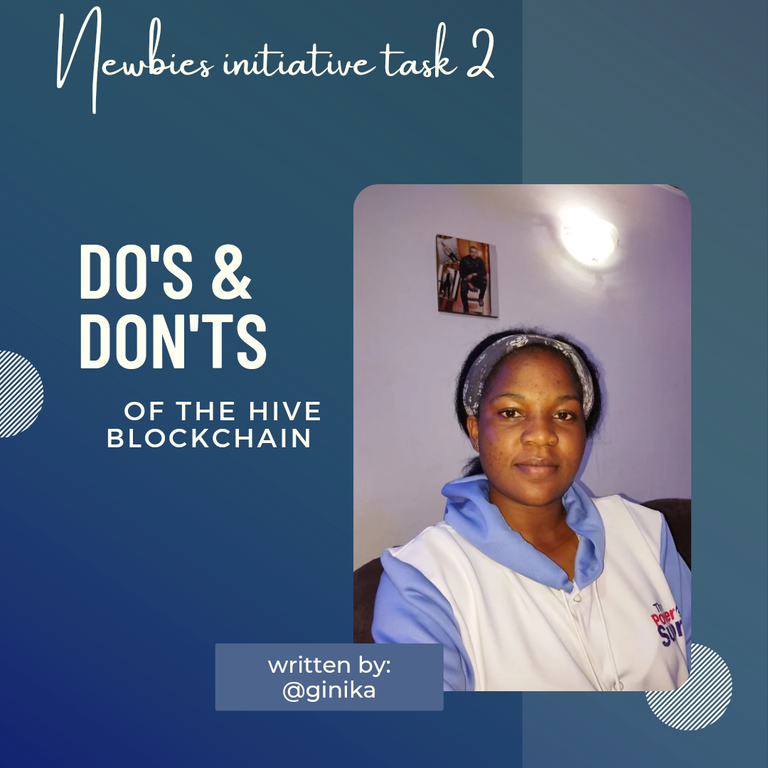
Our first task was all about setting goals, and I had the pleasure of partnering with @lizizoo. Together, we were able to establish realistic and achievable objectives for ourselves.
For this week, I've teamed up with @phyna who has a keen interest in markdown and recycling posts. She's curious to know why someone might want to recycle their previous content.
In today's post, I'll be sharing my understanding of the following topics that have been assigned to us as task 2:
The distinction between centralized and decentralized platforms, using a clear example.
A brief explanation of plagiarism, vote begging, and post recycling.
The importance of using appropriate tags in your posts.
A list of four general tags that I'm familiar with.
Let's start with the difference between centralized and decentralized platforms, using a simple example.
Previously, I struggled to grasp the concept of a centralized and decentralized platform, even though it was a topic discussed some time ago within the hiveghana community. However, in our recent meeting, I gained a clearer understanding.
| Platforms | Centralized | Decentralized |
|---|---|---|
| Difference with examples | Centralized platform is a system where a single person, known as the central authority, has control over all users transactions. This central authority manages the activities, data, and resources of all the users. A classic example is a traditional bank, where users need permission to perform any activity related to their account. | Decentralized platform is a system where users themselves have control over their accounts. It is designed to distribute control and authority among its users, with no central authority figure. A prime example of a decentralized platform is the hive blockchain, where users have full autonomy to make decisions regarding their accounts without requiring permission. Users can freely engage in transactions whenever they choose to. |
By understanding this contrast, we can see how different platforms operate and the implications for user control and autonomy.
Now, let's dive into the concepts of plagiarism, vote begging, and post recycling.
Lastly,
The importance of using the right tags in your post.
Using the right tags in your post is of utmost importance, especially for newcomers like myself. I have come to understand that each community has its own set of compulsory tags that must be used.
To ensure that you are using the correct tags, it is vital to familiarize yourself with the community rules. These rules will outline the required tags that must be included in your post. Additionally, you have ten spaces available for tags, so make the most of them. If you have any doubts or questions about the appropriate tags to use, don't hesitate to seek clarification.
In addition to the compulsory tags, there are also some Another useful general tag is "Proof of Brain" but written as
No doubt that the newbies initiative program has been a fantastic opportunity for growth and learning. As we progress through the program, it's crucial to understand the concepts of centralized and decentralized platforms, the usage of tags, avoid plagiarism, vote begging, and refrain from post recycling. By adhering to these principles, we can contribute positively to the hive community and maximize our own personal growth and success.
𝔇𝔦𝔡 𝔶𝔬𝔲 𝔫𝔬𝔱𝔦𝔠𝔢 𝔞𝔫𝔶 𝔡𝔦𝔣𝔣𝔢𝔯𝔢𝔫𝔠𝔢 𝔦𝔫 𝔪𝔶 𝔭𝔬𝔰𝔱? Yeah! I think you noticed. The way I presented this post is different from the previous posts and that is because I applied some juicy markdowns which actually made this post beautiful. Inputting markdowns are somewhat difficult and requires a lot of practice. But when you get a hold of it you wouldn't want to miss using them.
All this I learnt from Sunday's meeting. I really would like to appreciate @starstrings01 who has dedicated his time and effort to coach newbies on how to be a successful Hiver, what they need to know and how to go about it. Many thanks to all who has supported in one way or the other, and also to the team and group leaders behind scenes, I am deeply grateful for the opportunity given to me.



